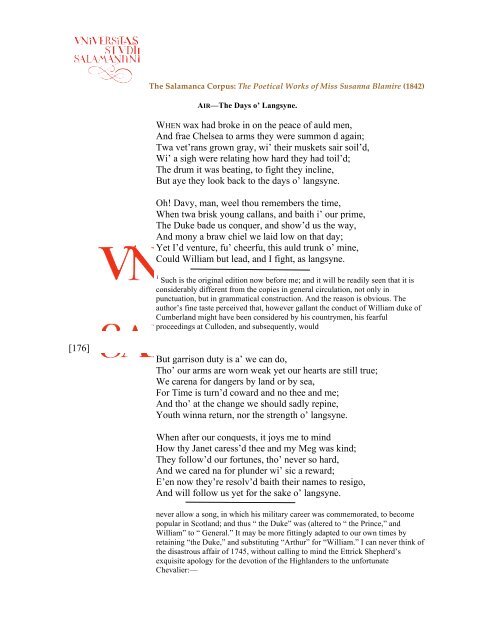The Poetical Works of Miss Susanna Blamire (1842) - Gredos ...
The Poetical Works of Miss Susanna Blamire (1842) - Gredos ...
The Poetical Works of Miss Susanna Blamire (1842) - Gredos ...
You also want an ePaper? Increase the reach of your titles
YUMPU automatically turns print PDFs into web optimized ePapers that Google loves.
<strong>The</strong> Salamanca Corpus: <strong>The</strong> <strong>Poetical</strong> <strong>Works</strong> <strong>of</strong> <strong>Miss</strong> <strong>Susanna</strong> <strong>Blamire</strong> (<strong>1842</strong>)<br />
AIR—<strong>The</strong> Days o’ Langsyne.<br />
WHEN wax had broke in on the peace <strong>of</strong> auld men,<br />
And frae Chelsea to arms they were summon d again;<br />
Twa vet’rans grown gray, wi’ their muskets sair soil’d,<br />
Wi’ a sigh were relating how hard they had toil’d;<br />
<strong>The</strong> drum it was beating, to fight they incline,<br />
But aye they look back to the days o’ langsyne.<br />
Oh! Davy, man, weel thou remembers the time,<br />
When twa brisk young callans, and baith i’ our prime,<br />
<strong>The</strong> Duke bade us conquer, and show’d us the way,<br />
And mony a braw chiel we laid low on that day;<br />
Yet I’d venture, fu’ cheerfu, this auld trunk o’ mine,<br />
Could William but lead, and I fight, as langsyne.<br />
1 Such is the original edition now before me; and it will be readily seen that it is<br />
considerably different from the copies in general circulation, not only in<br />
punctuation, but in grammatical construction. And the reason is obvious. <strong>The</strong><br />
author’s fine taste perceived that, however gallant the conduct <strong>of</strong> William duke <strong>of</strong><br />
Cumberland might have been considered by his countrymen, his fearful<br />
proceedings at Culloden, and subsequently, would<br />
[176]<br />
But garrison duty is a’ we can do,<br />
Tho’ our arms are worn weak yet our hearts are still true;<br />
We carena for dangers by land or by sea,<br />
For Time is turn’d coward and no thee and me;<br />
And tho’ at the change we should sadly repine,<br />
Youth winna return, nor the strength o’ langsyne.<br />
When after our conquests, it joys me to mind<br />
How thy Janet caress’d thee and my Meg was kind;<br />
<strong>The</strong>y follow’d our fortunes, tho’ never so hard,<br />
And we cared na for plunder wi’ sic a reward;<br />
E’en now they’re resolv’d baith their names to resigo,<br />
And will follow us yet for the sake o’ langsyne.<br />
never allow a song, in which his military career was commemorated, to become<br />
popular in Scotland; and thus “ the Duke” was (altered to “ the Prince,” and<br />
William” to “ General.” It may be more fittingly adapted to our own times by<br />
retaining “the Duke,” and substituting “Arthur” for “William.” I can never think <strong>of</strong><br />
the disastrous affair <strong>of</strong> 1745, without calling to mind the Ettrick Shepherd’s<br />
exquisite apology for the devotion <strong>of</strong> the Highlanders to the unfortunate<br />
Chevalier:—
















